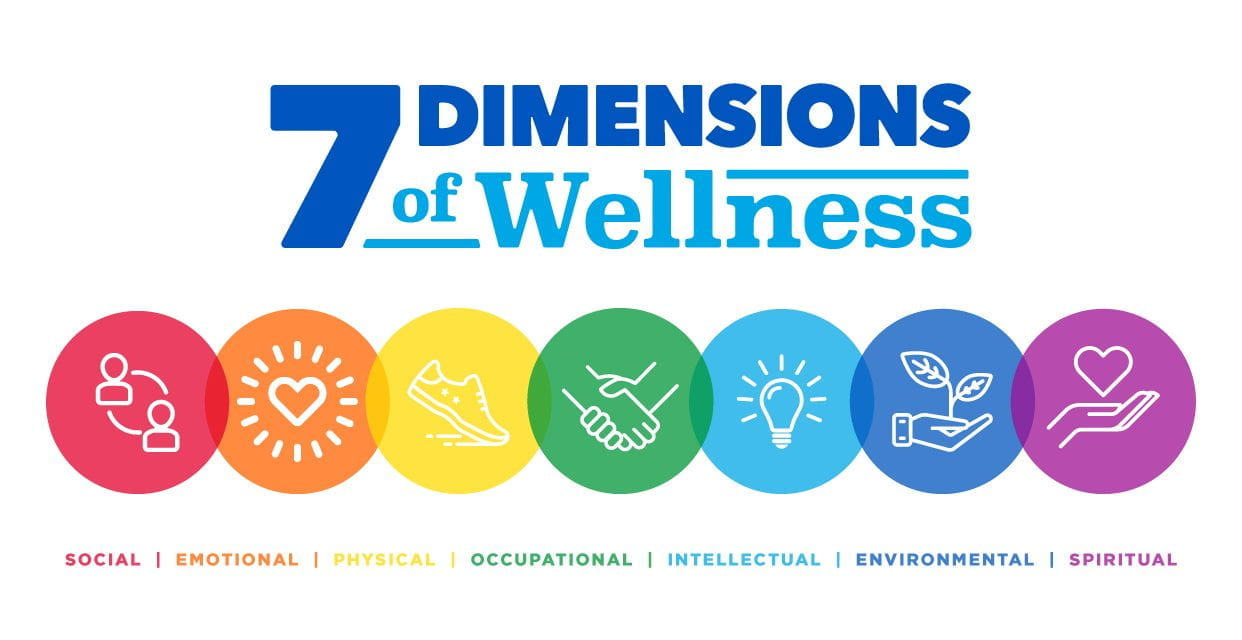The seven dimensions of mental health are social wellness, emotional wellness, physical wellness, occupational wellness, intellectual wellness, environmental wellness, and spiritual wellness.
SOCIAL WELLNESS
Social wellness involves building healthy, nurturing, and supportive relationships
and fostering a genuine connection with those around you.
Social wellness refers to the relationships we have and how we interact with others, this becomes especially important when we look for support during difficult times.
Achieving this includes conscious actions to support and maintain both academic, professional and
personal relationships. It’s an ever-fluctuating balance of connections in your life.
While maintaining your social network takes work by all parties to listen, talk and empathize, honoring your boundaries is equally essential – leaving energy for those connections that fuel
you the most. Who shows up for me, and how can I nurture those relationships?
EMOTIONAL WELLNESS
Emotional wellness inspires self-care, relaxation, stress reduction, and the development of inner strength while being attentive to both positive and negative feelings.
Emotional strength comes from awareness, understanding, and acceptance of your emotions with the ability to manage them effectively through challenges. Although many stresses are outside of our control, how we perceive the stress is within our control.
When looking at emotional wellness, it is crucial to take inventory of other aspects of your life – including sleep, rest, physical activity, nutrition. It becomes increasingly challenging to remain resilient to everyday stresses when running on empty. It’s essential to create those sustainable habits so when we do encounter stress, our body and mind are in a space to handle it appropriately. How do you cope with uncomfortable feelings?
PHYSICAL WELLNESS
Physical wellness promotes proper care of our bodies for optimal health and functioning. Many elements such as nutrition, physical activity, and hydration contribute to your physical wellness.
Of course, there are ideal ways to train and optimal types of exercises for different goals and seasons of life – however – we know the absolute best kind of movement is the one you will do! You can be prescribed the best of the best program, but if it doesn’t inspire you or give you a reason to move – you won’t. Find those classes, trainers, programs, facilities that inspire your mind, body and soul!
OCCUPATIONAL WELLNESS
Occupational wellness is the ability to achieve equity between work and leisure to promote health, a sense of personal satisfaction, and financial rewards (for most).
We hope to find personal satisfaction, purpose, and enrichment in our work by exploring our occupational wellness and maximizing our workplace satisfaction by focusing on work that brings you a sense of joy, purpose and accomplishment.
As work takes up a significant amount of time in our lives, it’s important to maximize workplace happiness – setting professional goals, engaging with an inspiring mentor and committing to equity between work and personal life.
INTELLECTUAL WELLNESS
Intellectual wellness is the ability to open our minds to new ideas and experiences and apply them to personal decisions, group interaction and community betterment. Improve skills, seek challenges and lifelong learning.
Challenging the mind through continuous learning is beneficial for this aspect of wellness—participation in activities you love and are good at, with new and challenging activities.
We can learn more from our not-so-good experiences than we can learn from our good ones (-Sonia Sotomayor). Exploring the concept of failing forward inspires the idea of learning, not failure – an opportunity to explore and learn what went wrong.
ENVIRONMENTAL WELLNESS
Environmental wellness is having optimal health by occupying pleasant, stimulating environments that support well-being.
Environmental wellness creates an enjoyable personal environment in which you live and work and includes interaction with nature.
This dimension of wellness can impact your behavior and motivation to act positively! For example, having a messy kitchen full of dirty dishes and a lack of storage may hinder your motivation to cook a meal for yourself. If you have a clean, well-organized environment, it may entice you to spend more time cooking!
SPIRITUAL WELLNESS
Spiritual wellness is having a set of values, principles, morals and beliefs that provide a sense of purpose and meaning to your life – then using those principles to guide your actions.
“Informed optimism doesn’t mean you only look at the bright side. It means you don’t overlook the bright side. If you don’t see possibility, you can’t solve problems. If you can’t imagine a best case, you don’t make things better.” – Adam Grant
Our choices are often reflections of our own beliefs or guiding principles. These beliefs will develop into a value when your commitment to it grows as you see it as being important. It’s beneficial to articulate your values to make clear, rational, and responsible decisions.
Work on your wellness with MacEwan University’s Mental Health Week events and activities from January 23 to 27. MacEwan students can pre-register for Sport and Wellness events including a float, sensory room, trauma yoga, and a spa day at the pool.
By Jenni Varughese
Jenni is an exercise specialist and instructor at MacEwan University Sport and Wellness. Certified with the Canadian Society for Exercise Physiology, Jenni has worked with a great range of clientele – predominantly those with chronic disease, pre/post-op orthopedic surgery, and mental health challenges.


